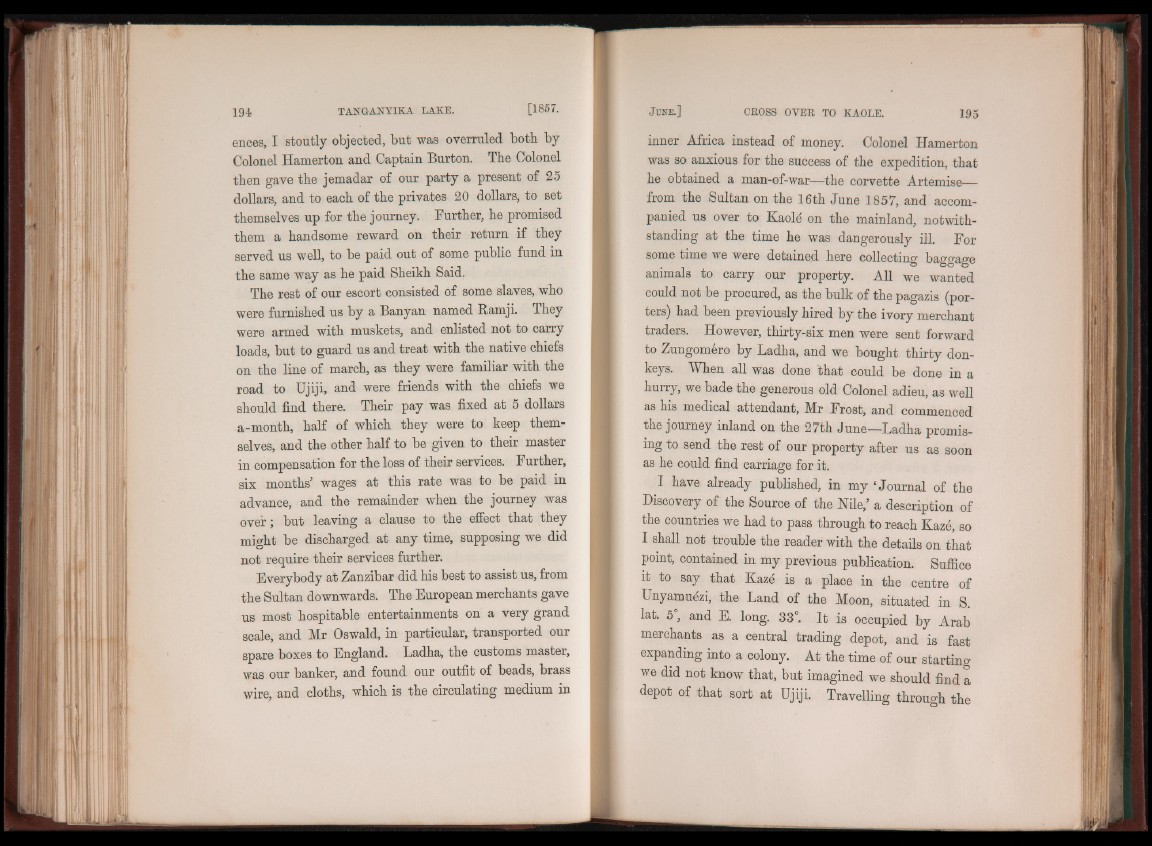
ences, I stoutly objected, but was overruled both by
Colonel Hamerton and Captain Burton. The Colonel
then gave the jemadar of our party a present of 25
dollars, and to each of the privates 20 dollars, to set
themselves up for the journey. Further, he promised
them a handsome reward on their return if they
served us well, to be paid out of some public fund in
the same way as he paid Sheikh Said.
The rest of our escort consisted of some slaves, who
were furnished us by a Banyan named Ramji. They
were armed with muskets, and enlisted not to carry
loads, but to guard us and treat with the native chiefs
on the line of march, as they were familiar with the
road to Ujiji, and were friends with the chiefs we
should find there. Their pay was fixed at 5 dollars
a-month, half of which they were to keep themselves,
and the other half to be given to their master
in compensation for the loss of their services. Further,
six months’ wages at this rate was to be paid in
advance, and the remainder when the journey was
over; but leaving a clause to the effect that they
might be discharged at any time, supposing we did
not require their services further.
Everybody at Zanzibar did his best to assist us, from
the Sultan downwards. The European merchants gave
us most hospitable entertainments on a very grand
scale, and Mr Oswald, in particular, transported our
spare boxes to England. Ladha, the customs master,
was our banker, and found our outfit of beads, brass
wire, and cloths, which is the circulating medium in
inner Africa instead of money. Colonel Hamerton
was so anxious for the success of the expedition, that
he obtained a man-of-war—the corvette Artemise—
from the Sultan on the 16th June 1857, and accompanied
us over to Kaole on the mainland, notwithstanding
at the time he was dangerously ill. For
some time we were detained here collecting baggage
animals to carry our property. All we wanted
could not be procured, as the bulk of the pagazis (porters)
had been previously hired by the ivory merchant
traders. However, thirty-six men were sent forward
to Zungomero by Ladha, and we bought thirty donkeys.
When all was done that could be done in a
hurry, we bade the generous old Colonel adieu, as well
as his medical attendant, Mr Frost, and commenced
the journey inland on the 27th June—Ladha promising
to send the rest of our property after us as soon
as he could find carriage for it.
I have already published, in my ‘Journal of the
Discovery of the Source of the Nile,’ a description of
the countries we had to pass through to reach Kaze, so
I shall not trouble the reader with the details on that
point, contained in my previous publication. Suffice
it to say that Kazd is a place in the centre of
Unyam uezi, the Land of the Moon, situated in S.
lat. 5 , and E. long. 33°. I t is occupied by Arab
merchants as a central trading depot, and is fast
expanding into a colony. At the time of our starting
we did not know that, but imagined we should find a
depot of that sort at Ujiji. Travelling through the